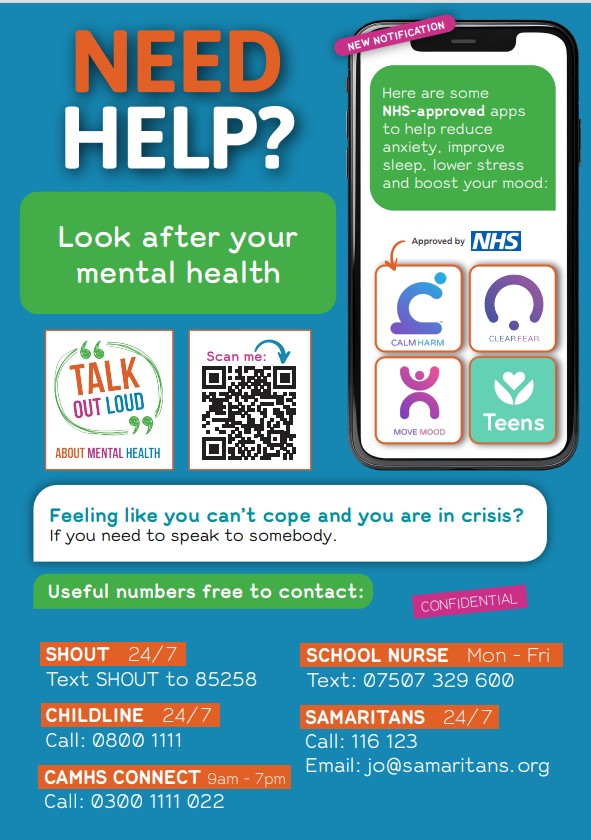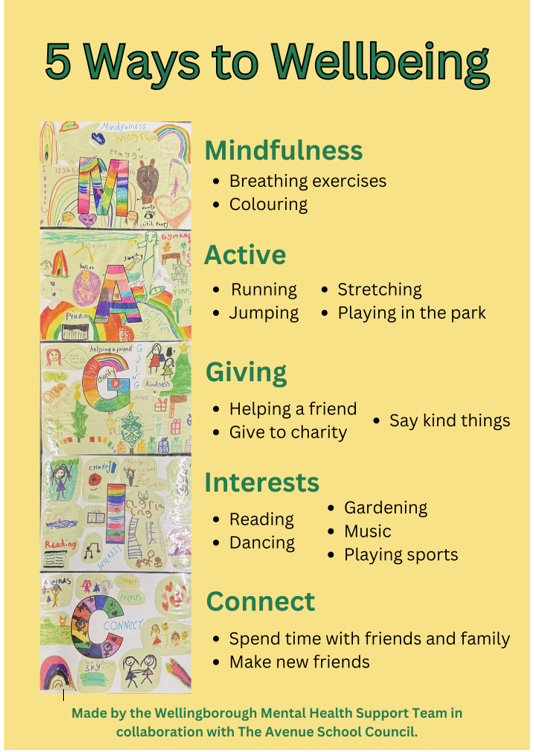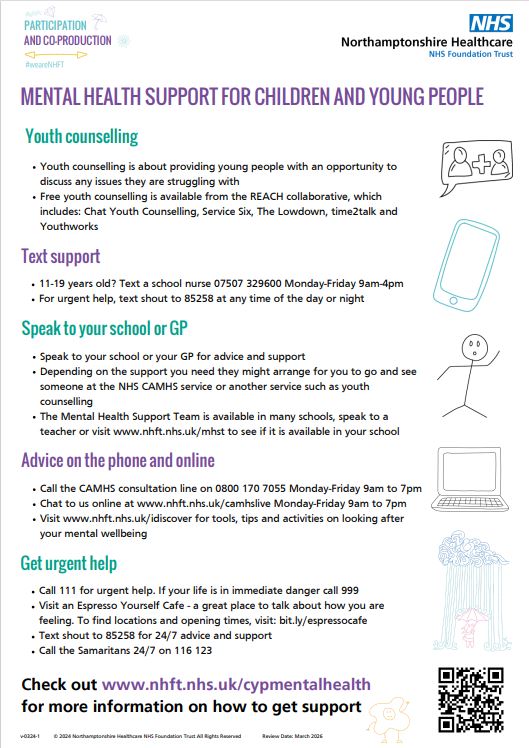- Home
- Parents & Carers
- Family Support, Pastoral Care and Well-being & Mental Health
- Mental Health & Wellbeing Support
Mental Health & Wellbeing Support
This page contains information on mental health and wellbeing support that we hope you will find useful. We are here to help, and we encourage you to reach out if you have concerns or questions about your child's emotional wellbeing or yourself.
What is Mental Health?
Mental health includes our emotional, psychological, and social well-being. It affects how we think, feel, and act. It also helps determine how we handle stress, relate to others, and make choices. Mental health is important at every stage of life, from childhood and adolescence through to adulthood.
What is Wellbeing?
Wellbeing is defined as a sense of health and vitality that arises from your thoughts, emotions, actions, and experiences. When we have good well-being, we feel happy, healthy, socially connected, and purposeful most of the time.
We promote the 5 Ways to Wellbeing approach to support mental health and wellbeing. These are five simple actions that are known to improve both mental health and wellbeing, as promoted by the NHS and charities such as Mind.
These 5 ways to wellbeing are:
- Connect
- Be active
- Take notice
- Keep learning
- Give

Ways we support our children
We tailor our support for our children and young people according to their needs. As part of our ongoing plan, we continue to train staff to identify where pupils' mental health may need some additional help, both from our pastoral staff or access to external services. See below for some of the support available.
- Child and Mental Health Services (CAMHS)
- Service 6 - Happy Head programme
- GP
- Children's 0 - 19 team, including the School Nurse team
- Wellbeing sessions with Happy Karen
- Jogo Behaviour Support
- Nurture Group
- Educational Psychologist
- Ask Normen
We provide the following wellbeing activities for our children and young people:
- Meet and Greet
- Pastoral support
- Drawing and Talking programme
- Protective Behaviours
- Emotion Coaching
The Difference between Mental Health and Mental Illness
Mental health and mental illness are not the same thing. Poor mental health and struggling to cope is also different from having a mental illness. A mental illness or mental health disorder is an illness that affects the way people think, feel, behave, or interact with others. There are many types of mental illnesses/ health disorders with different signs and symptoms.
Generally, the difference between poor mental health and mental illness is the nature of and degree to which the difficulties someone is experiencing is having on their wellbeing and functioning (socially, occupationally and academically). Mental illness typically has more of a significant detrimental impact across many areas of an individual’s life than episodes of poor mental health which may be situation specific or time limited.
Anyone of any age, gender, geographical background, race, ethnicity, class, background, religion, ability, appearance, culture, caste, education, economic status, spirituality, sexual orientation can experience mental illness.
Early Warning Signs
Not sure if you or someone you know is living with mental health problems? Experiencing one or more of the following feelings or behaviours can be an early warning sign of a problem:
Eating or sleeping too much or too little
Pulling away from people and usual activities
Having low or no energy
Feeling numb or like nothing matters
Having unexplained aches and pains
Feeling helpless or hopeless
Smoking, drinking, or using drugs more than usual
Feeling unusually confused, forgetful, on edge, angry, upset, worried, or scared
Yelling or fighting with family and friends
Experiencing severe mood swings that cause problems in relationships
Having persistent thoughts and memories you can't get out of your head
Hearing voices or believing things that are not true
Thinking of harming yourself or others
Inability to perform daily tasks like taking care of your kids or getting to work or school
Maintaining Positive Mental Health
Ways to maintain positive health include:
- Getting professional help if you need it
- Connecting with others
- Staying positive
- Getting physically active
- Helping others
- Getting enough sleep
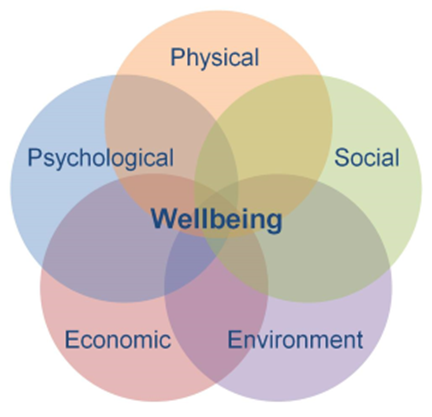
Recognising Anxiety Disorders in Children
Anxiety disorders are one of the most common mental health problems identified in children. Estimates of the rates of prevalence vary greatly from 8% to 27% lifetime prevalence by age 18.
Chronic anxiety disorders are associated with increased risk of other serious mental health problems in later life. Therefore, early identification and treatment is key.
Normal fears vs Anxiety Disorder
Fears and worries are a normal part of child development and the content of fears change according to the individual’s developmental stage.
Anxiety disorders occur when the intensity of the fear or worry is so high that it starts to impact on the child’s functioning and well-being and/or when the anxiety is out of context with their developmental stage.
‘Normal’ fears in development
• Infancy - Loud noises - Heights - Loss of physical support
• 1-2 years - Strangers - Toileting activities - Being injured
• 3-5 years - Animals - Monsters - The dark - Being alone
• 6-9 years - Animals - Lightning and thunder - Personal safety/injury - School - Death
• 9-12 years - Tests - Personal health
• 13 years - Social interactions - Personal injury - Economics and politics
Types of Anxiety Disorder
‘Anxiety disorder’ is a broad term to encompass a number of different types of disorder that lead to the young person experiencing physiological symptoms of anxiety and marked avoidance of feared situations.
Different types of anxiety disorder are:
• Panic disorder • Health anxiety
• Agoraphobia • Separation anxiety disorder
• Specific phobia • Generalised anxiety disorder (GAD)
• Social anxiety • Selective Mutism
Main Key Symptoms
- Physiological symptoms of anxiety
- Negative thoughts or worries
- Avoidance
- Safety behaviours
Special Characteristics in pre-school and school aged children
- Tantrums/behavioural outbursts
- Problems with sleep, including nightmares about feared situations
- Friendships
- Separation from adults
- Illness
How to help
- Talk to your child about the cause of the anxiety
- Make links between physical sensations and anxiety - normalise these sensations
- If possible, encourage your child to face feared situations in a way that feels manageable for them.
Speak to the school or GP if the anxiety persists, or gets worse and when it impacts on functioning, for example, refusing to go to school.
Find out more
Nip in the Bud | Child Mental Health Resources for Parents and Teachers
Mental Health Support Teams
Hi, we are NHFT’s Wellingborough and East Mental Health Support Teams (MHST).

The MHST’s have been created to offer early intervention, low intensity, mental health support within schools for children and young people with mild to moderate mental health difficulties. Some of the areas we can support with include worries and anxiety, low mood, managing emotions and transitions.
The MHST will also support your school’s Mental Health Lead to introduce and develop their Whole School Approach to mental health, which involves the whole school community working together to promote and protect mental health and wellbeing. Individual referrals can be made via the school’s Mental Health Lead or by speaking to your child’s class teacher. We also offer group work and workshops for young people, staff and parents. We look forward to meeting you.
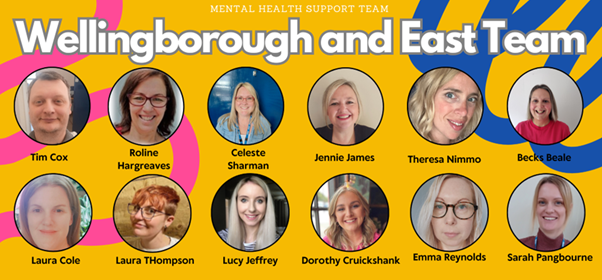
Useful Resources and Links
Help and Support in Northamptonshire
This has a large amount of information and contact details to help with a wide variety of areas, including mental health, family support, money and daily life advice, emotional support etc.
Parents Helpline | Mental Health Help for Your Child | YoungMinds
This is a confidential service (unless hate advisors think the young person is at risk). The advisor will listen and give some practical guidance on how to help. If you need further help, they will refer you to a specialist, whether it is a psychotherapist, psychiatrist, psychologist or mental health nurse. They will arrange a phone consultation within seven days.
Home - Calm Harm App (stem4.org.uk)
This is designed to help young people resist the urge to self-harm, it is free and password protected.
This site is for everyone with an interest in the emotional wellbeing and mental health of children and young people in Northamptonshire. It contains a search tool and links to a directory of services.
A mental health charity which provides advice and information on mental health illnesses.
Parents' A-Z Mental Health Guide | Mental Health Advice | YoungMinds
A - Z guide to help your child with their feelings and behaviour, as well as mental health conditions and life events.
Signs That a Child Is Suffering From Mental Health Issues | NSPCC
Advice to help you support children who may be experiencing depression, anxiety, suicidal feelings or self-harm
NHS England » Children and Adolescent Mental Health Service (CAMHs) Inpatient Services
